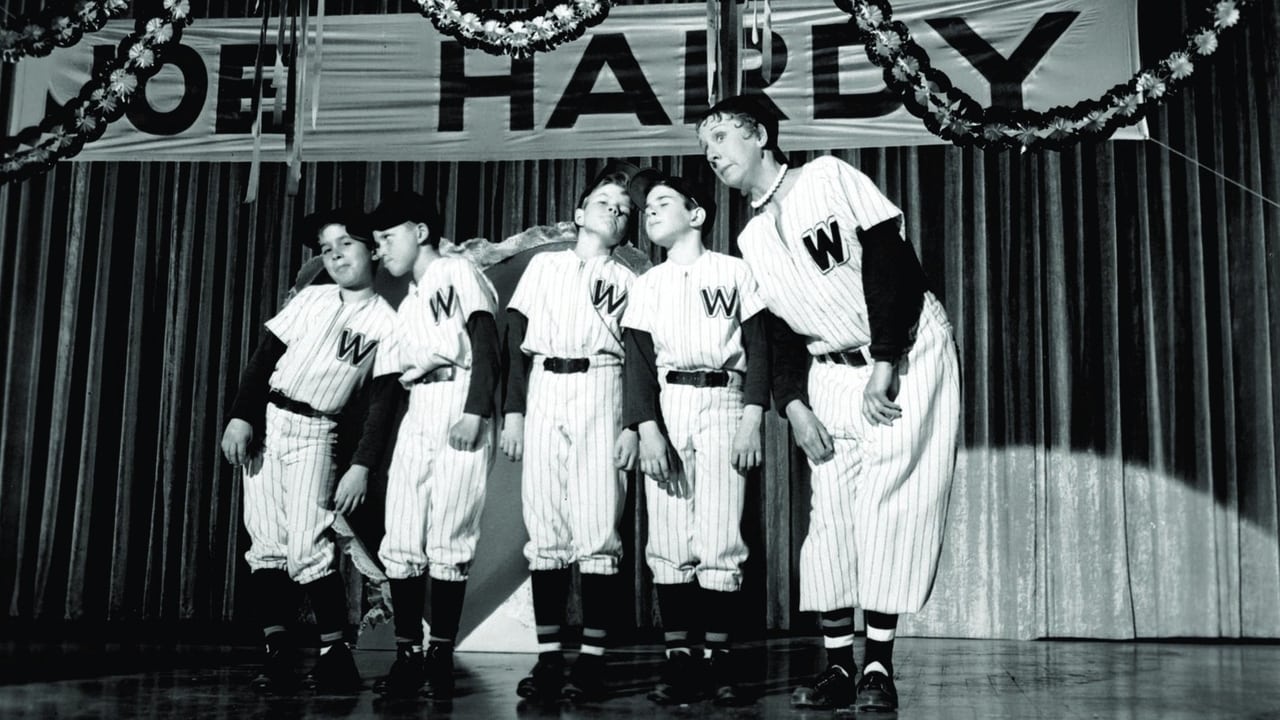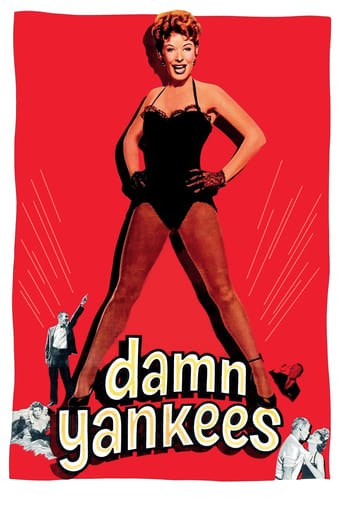Titreenp
SERIOUSLY. This is what the crap Hollywood still puts out?
Kamila Bell
This is a coming of age storyline that you've seen in one form or another for decades. It takes a truly unique voice to make yet another one worth watching.
Ella-May O'Brien
Each character in this movie — down to the smallest one — is an individual rather than a type, prone to spontaneous changes of mood and sometimes amusing outbursts of pettiness or ill humor.
Marva-nova
Amazing worth wacthing. So good. Biased but well made with many good points.
capone666
Damn Yankees Due to all of the skulls that they've crushed, baseball bats probably have a special place in Hell.So, it's no wonder the Devil's willing to assist the die-hard fan in this musical.When Joe (Tab Hunter), a Senators fan, proclaims he'd sell his soul for his club to beat the Yankees, the Devil appears in the form of a man, Applegate (Ray Walston).Offering to go Joe one better, Applegate promises to make Joe the star player. The only hitch: he must hand over his soul at the end of the season.Agreeing, the next day Joe begins his career and leads the Senators to the pennant, playing right into Applegate and his assistant Lola's (Gwen Verdon) hands.The film version of the musical based on the story of Faust, Damn Yankees has a devilishly good story to accompany its unforgettable songs.However, isn't Hell's representative in baseball already Pete Rose? (Yellow Light)http://vidiotreviews.blogspot.com/
evanston_dad
I saw "Damn Yankees" shortly after seeing another George Abbott/Stanley Donen collaboration, "The Pajama Game," which set the bar so low that just about any musical would seem better."Damn Yankees" on its own terms is a little flat and never explodes into the energy it probably has on stage, but it comes close, and much closer than "The Pajama Game" ever does. Gwen Verdon is almost exclusively the film's appeal -- not especially pretty, there's nevertheless something about her (call it good old-fashioned show-biz chutzpah) that makes it impossible to take your eyes off of her when she's on the screen. And this film benefits from a slew of dance numbers choreographed by Bob Fosse, the most memorable being the "Who's Got the Pain?" number that Fosse himself dances with wife Verdon (though I'm not sure whether or not they were married when they made this movie). If for no other reason, see this film for that number, which captures two theatre legends at their best.Grade: B
graham clarke
"Damn Yankees" is not a musical I'm particularly fond of. It's all American pervasiveness what with the baseball milieu and the ever reliable good vs. evil theme seems somewhat calculated. Apart from two or three pleasant songs, the score is not really of much interest. Still, it certainly could have fared better on the screen, despite some of the legendary talents involved.Hollywood has often wrestled with the decision whether or not to cast original Broadway stars in screen adaptations of hit musicals. It's not an always an easy choice. There's an apparent unfairness in overlooking those who contributed so much to a musical's success. But the studios have more often than not been right in their choices. Sensational stage stars are not always as magical on screen. The most controversial case was of course Audrey Hepburn chosen over Julie Andrews for "My Fair Lady", which in retrospect, seems to me to have been a smart choice. Gwen Verdon's status as a stage performer is legendary. While we should be grateful for "Damn Yankees" in allowing us an opportunity to witness Verdon's talents; on screen there's much lacking. My immediate impression was that she was too old for the role. I was stunned to find out she was only 33 at the time. Despite the sexy moves, it's a little hard to swallow her so called seductive powers. Verdon would come into her own on the screen in her latter years. As intriguing as it is to imagine a screen version of "Chicago" with Verdon and Chita Rivera reprising their original roles, one cannot help but wonder how kind the big screen would have been to them.At the time there was apparently opposition in the casting of Tab Hunter who it was hoped would lure teenage audiences. Co-director Stanley Donen is quoted as calling Hunter a triple threat; can't sing, can't dance, can't act. While he was not much of a dancer, he turned in a convincing and touching performance and certainly was physically perfect for the part. As to his vocals, they are in no way inferior to the others on display. Verdon has an attractive rasp, but the others are uniformly mediocre.There are a couple of enjoyable dance sequences, but at this point, Bob Fosse was still early in his career and his choreography is nowhere as inventive as his later works.There are many points of interest especially for fans of the musical, but "Damn Yankees" remains ultimately a second rate screen musical.
theowinthrop
This musical, when revived about a decade ago with Jerry Lewis as Applegate, was referred to as a fable for the Eisenhower Years. It is set in a faintly comfortable period (once the McCarthyite Persecutions were finished), because the concept of this musical was the preoccupation of the American public with the national pastime of baseball, and it's singular domination (between 1947 and 1962) by the New York Yankees. Although the Yankees had had other periods of greatness, with Ruth, Gehrig, "Murderers Row" in the late 1920s and early 1930s, they had to share the domination of the World Series with other teams in that period (the Philadelphia Athletics, the Detroit Tigers, and the St. Louis Cardinals, to name three). But the Yankees in this period started with Joe DiMaggio, entered into the period dominated by Mickey Mantel, Whitey Ford, Billy Martin, Yogi Berra, Phil Rizzuto, Don Larsen, Roger Maris, and presided over by Casey Stengel. They did not always win (one memorable defeat was by their perennial enemy the Brooklyn Dodgers in 1955), but they won so often that to non-baseball fans it was monotonous to follow the sports news: you knew what should finally happen.So the background of this baseball era is important to understand the musical (one of the few times the actual historical background of the time the musical was created becomes that important). Joe Boyd (Robert Shafer) is a fanatical baseball lover and fan of the woebegone Washington Senators (the saying for many years about the Senators was, "First in war, first in peace, and last in their league."). The team had only one great moment: in 1924 they won the World Series when the team had one of baseball's greatest players on it - Walter Johnson. But it never really was in competition again after that. But Boyd is a fan, and he makes the mistake of being willing to sell his soul to allow the Senators a chance to win the series again. Enter Mr. Applegate (a.k.a. the Devil) played fiendishly well by Ray Walston. He offers Joe a contract that will make Joe the greatest baseball player of all time - and lead to the world series - in return for his soul. Hesitant at first, Joe agrees. He is transformed into Joe Hardy (Tab Hunter), and proceeds to try to join the Senators (with Applegate as his agent).The Devil can never be trusted in any agreement. Applegate hopes to cause a wave of hope and hysteria by the anti-Yankee baseball public, letting Joe lead his team to the World Series. He plans to pull the rug from underneath the team at the final moment. Unfortunately Joe is a good salesman on his own, and has insisted on an escape clause for himself. Applegate has to accept it for the sake of his own plans. The escape clause is there because Joe loves his wife Meg (Sharon Bolin) and does not want her to be hurt. So Applegate decides to recruit his best female agent, Lola (Gwen Vernon) to vamp Joe and make him forget Meg. But Joe is too faithful, and succeeds in overcoming Lola's "irrisistable" personality (as she sings, "Whatever Lola wants, Lola gets" - except here). Lola, shaken by the experience, becomes a type of groupie for Joe - and eventually starts a mini-revolt on her own against Applegate.The score of the show is memorable. Besides the key song "Heart" (sung by the Washington team players), and Lola's "Whatever" number, there is also "Two Lost Souls", "Goodbye Old Girl" and Walston's wonderful "Those were the good old days!" (when he fondly recalls all the tragedies he created in the history of mankind - including the day Jack the Ripper was born). Walston was not nominated for any awards for the movie performance*, but his Applegate is one of his best film performances, with his Gillis in SOUTH PACIFIC. He had played both on Broadway first, so we are lucky to have his film performances here.*(But won the Tony Award for the role on stage.)Stanley Donan co-directed this film with George Abbott. Abbott was usually a stage director (he had done the musical on Broadway). There is a moment when it is apparent that he is directing. There is a small dance done by one of the three ball players in the "Heart" number, and the close-up of the player as he smiles shyly and steps forward is out of place in the film - but would have worked on stage.

